Ancient action movie: The incredible retreat of 10 thousand Greek mercenaries from Persia
Categories: Asia | Conflict | History | Nations | World
By Pictolic https://pictolic.com/article/ancient-action-movie-the-incredible-retreat-of-10-thousand-greek-mercenaries-from-persia.htmlOne of the most interesting documents left by the ancient Greeks is a work called "The Anabasis of Cyrus", translated from the Greek "The Ascent of Cyrus". It describes the path of 10 thousand Greek mercenaries who found themselves in the center of the Persian power, and were forced to break home for more than a year, overcoming mountains, deserts and hostile peoples. The work was written by a resident of Athens and a participant of the campaign Xenophon.

The Persian king Darius II had two sons from his own sister Parisatida-the elder Artaxerxes and the younger Cyrus. After his death, Artaxerxes II became the heir, and the second son was appointed to the post of satrap of Asia Minor. Cyrus turned out to be a brave and determined guy. He dreamed of becoming a king and, having hired an army of Greeks, went to war against his own brother.
 The court of the Persian King Artaxerxes
The court of the Persian King Artaxerxes
Xenophon writes that more than half of the fighters came from Arcadia and Achaia, the poorest regions of Greece, where mercenary service has become a tradition. In the army there were representatives of almost all regions and polises of ancient Hellas. In total, Cyrus ' army consisted of 9,600 Hoplites and several thousand riflemen. The Spartan commander Clearchus commanded a team of Greek thugs. Xenophon described this man as follows:
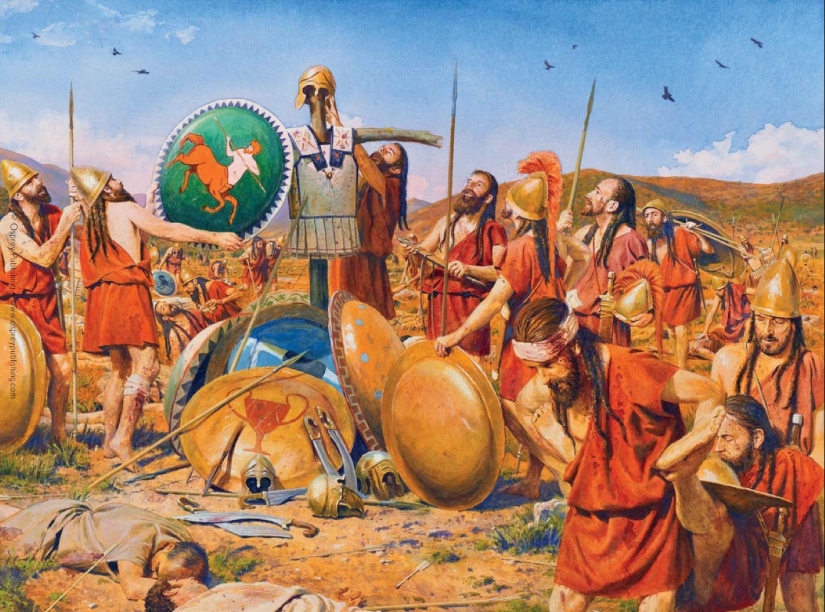 At first, Cyrus told the mercenaries that they were going to conquer the barbarians who had rebelled against the Persian power, and only before the decisive battle said that he wanted to overthrow the royal brother. Unrest began in the army, but the riot of the mercenaries stopped the promise of an additional payment. Instead of one darik (8.4 grams of gold) per month, Cyrus promised the fighters one and a half and a share in future trophies.
At first, Cyrus told the mercenaries that they were going to conquer the barbarians who had rebelled against the Persian power, and only before the decisive battle said that he wanted to overthrow the royal brother. Unrest began in the army, but the riot of the mercenaries stopped the promise of an additional payment. Instead of one darik (8.4 grams of gold) per month, Cyrus promised the fighters one and a half and a share in future trophies.
At the end of the summer of 401 BC, the brothers met for a decisive battle north of Babylon. On the side of Cyrus, the Greeks and Persian allies fought, no more than 20 thousand fighters in total. The exact number of Artaxerxes ' army is not known, but he had much more soldiers than Cyrus.
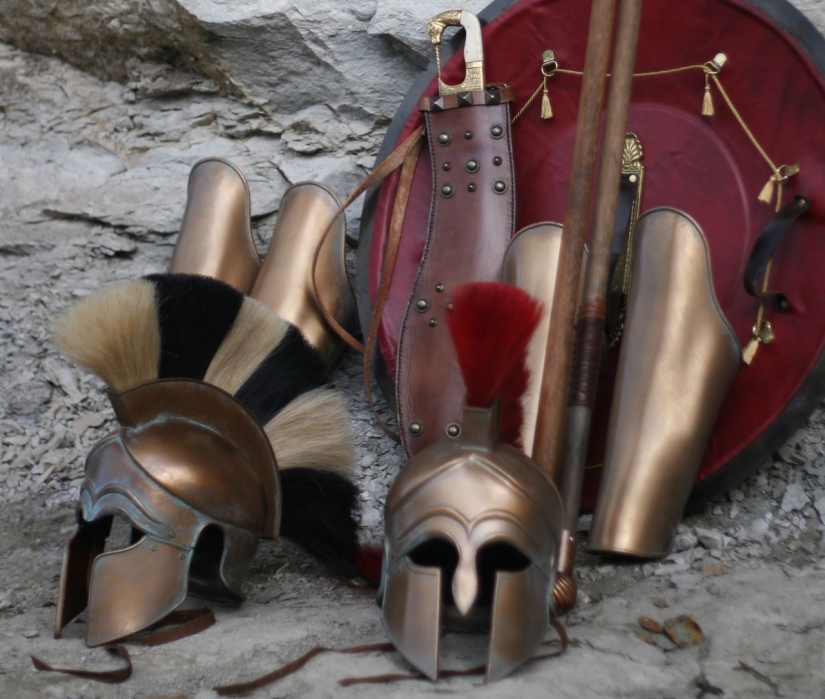 Armament of the Greek Hoplites
Armament of the Greek Hoplites
Most of the Greek army consisted of Hoplites, dressed in cuirasses or linen armor and deaf Corinthian helmets. The main part of the warrior's ammunition was an 8-kilogram hoplon shield, a spear and a sword. The hoplites fought in a tight formation-a phalanx, while the warrior protected not only his left side, but also the right side of his comrade with a large shield.
The Persian army most often consisted of light infantry recruited from the conquered peoples. At the first failure, they threw down their weapons and fled from the battlefield.
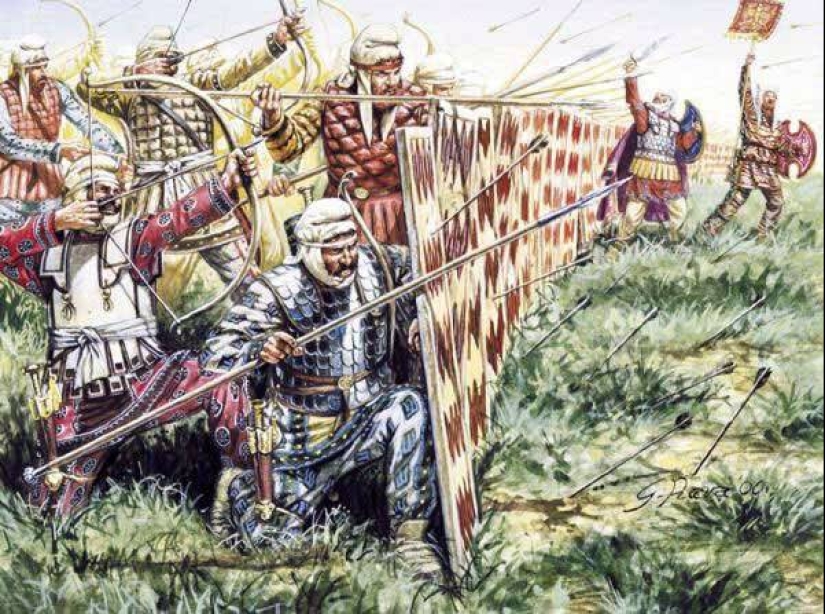
Persian Guard
The uniformity of weapons, resistance in battle and excellent training made the Greeks the main fighting force of the Eastern Mediterranean. Preparing for the battle, Clearchus built the fighters in a classic phalanx, the right flank of which was pressed to the Euphrates River. The Persian part of Cyrus ' army was located on the left flank. Clearchus persuaded his employer not to risk himself and go to the rear, but the brave Cyrus refused and at the head of 600 horsemen decided to try his luck on the battlefield.
In the afternoon, the Greeks attacked, and in order to save their strength for a hand-to-hand fight, Clearchus forbade the Hoplites to escape. The very sight of the slowly approaching dense formation of people dressed in shining armor, who are covered from arrows with huge round shields, turned the enemy into panic. The Persian infantry fled without even entering into a fight with the enemy, and the Greeks, going on the run, finished off those who escaped in the last ranks of the retreating. War chariots — the main striking force of Artaxerxes not only did not correct, but also worsened the situation.
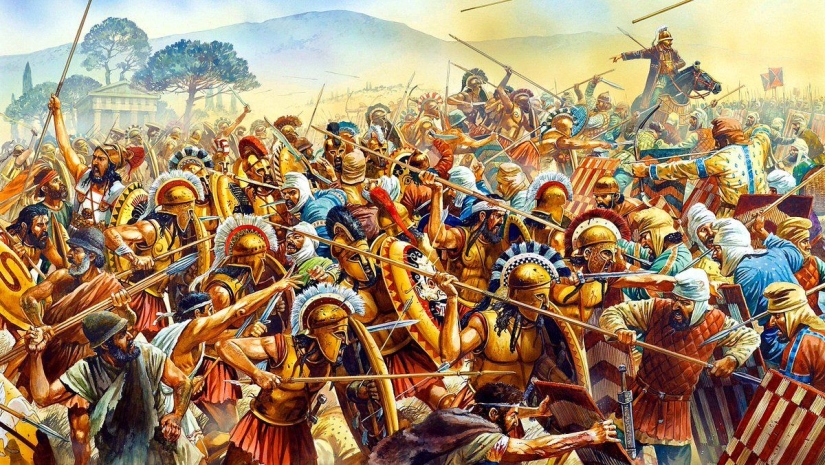 A trained phalanx, when chariots hit it, bred a formation, where the Persians were warmly welcomed by lightly armed soldiers. They cut the horses ' legs and finished off the drivers with blades. Some of the chariots were killed, and the rest turned and ran, killing and maiming their own infantry with sickles fixed on the wheels. According to Xenophon, during the battle, the Greeks lost only one warrior, who was wounded by an arrow.
A trained phalanx, when chariots hit it, bred a formation, where the Persians were warmly welcomed by lightly armed soldiers. They cut the horses ' legs and finished off the drivers with blades. Some of the chariots were killed, and the rest turned and ran, killing and maiming their own infantry with sickles fixed on the wheels. According to Xenophon, during the battle, the Greeks lost only one warrior, who was wounded by an arrow.

The legitimate tsar decided to save the situation and, at the head of a cavalry detachment, began to bypass the left flank of the Greek phalanx. His brother's maneuver was noticed by Cyrus, who rushed to intercept him. The contenders for power met face to face in the cavalry control room. Artaxerxes struck Cyrus with a spear, but the shell withstood. Then the younger brother threw a dart at the older one and hit the unprotected throat. The king of Persia, bleeding, lost consciousness.
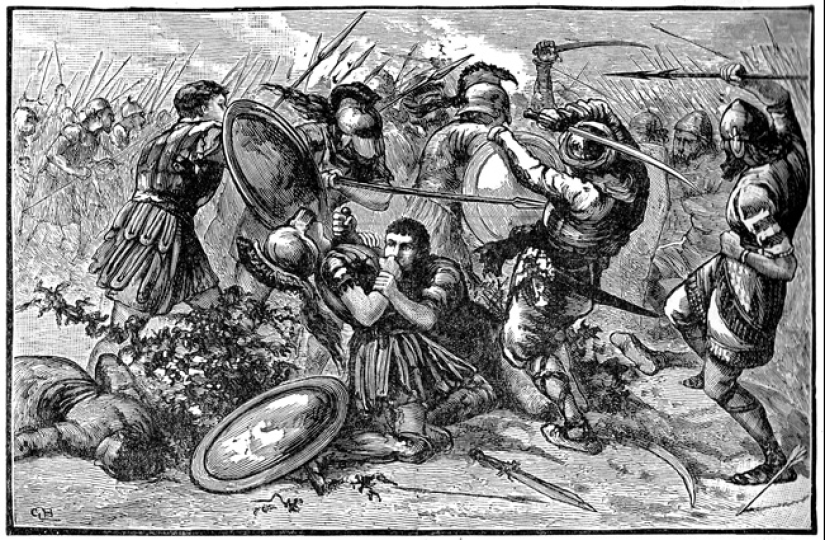
The battle of the brothers Cyrus and Artaxerxes
Cyrus, sensing the smell of blood, rushed to the enemy, killed his horse and wounded his brother through the shell with a spear. The bodyguards came to the aid of the king, who beat off the wounded body of the lord, and one of the soldiers, throwing a dart, hit Cyrus in the face. The younger brother was killed on the spot.
The Greeks, not knowing that their employer was killed in the battle, continued to grind the masses of enemy infantry and cavalry. They fought, even when the Persian colleagues in the dangerous craft fled. The troops of Artaxerxes, pursuing the collapsed left flank of Cyrus, broke into the enemy's camp and began to plunder it. They were stopped by the same Greeks, some of whom were guarding the wagon train. These were veterans aged 45 years and older. Due to past wounds or old age, the mercenaries could not fight in the phalanx, but they knew how to shed the blood of the enemy. In a short fight, the Persians were slaughtered.

At this time, the phalanx of mercenaries stopped the offensive and began to retreat to the camp. The king's father-in-law and the most influential nobleman of Persia, Tissaphernes, gathered the remaining forces of the Persians and led them to the wounded Artaxerxes. The second round of the battle also turned out to be for the Greeks, who again broke the Persians, but did not pursue them. In the evening, the scouts reported to Clearchus that the enemy was retreating along the entire front, and the Greeks retreated to the camp.
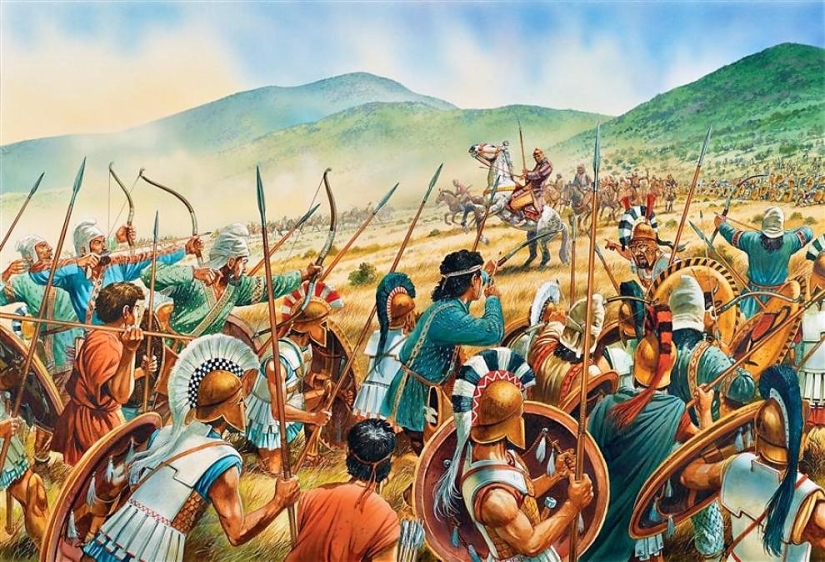 At night, Artaxerxes came to himself and thought that he had lost the war, but it was the opposite. Scouts came to the king and said that Cyrus was dead. The soldiers found the rebel and, according to the Persian custom, cut off his head and hand, which he dared to raise against the legitimate ruler. Artaxerxes has only one problem left — 10 thousand invincible Greeks in the center of his empire.
At night, Artaxerxes came to himself and thought that he had lost the war, but it was the opposite. Scouts came to the king and said that Cyrus was dead. The soldiers found the rebel and, according to the Persian custom, cut off his head and hand, which he dared to raise against the legitimate ruler. Artaxerxes has only one problem left — 10 thousand invincible Greeks in the center of his empire.
In the morning, a Greek in the service of Artaxerxes came to the camp. He told his countrymen that Cyrus had died and offered the mercenaries to surrender, they refused. The employer is dead, but they are not defeated. If the enemy wants the Greeks to surrender, let them fight. The mercenaries understood that the Persians would not defeat them in the field. The general mood of the Greeks was voiced by one of the Athenians, who replied to the ambassador:
The enemy did not attack, at night several hundred Greeks went over to the side of Artaxerxes and discipline began to fall in the camp. Two days later, Tissaphernes came to Clearchus for negotiations. The governor proposed a compromise solution: the Hellenes go home, but on the way they do not rob villages and cities, but take only provisions from the locals. Later, a second offer was received…

The Greeks came for wealth and fame, but they did not get either the first or the second. The Persians interested Clearchus and his strategists by switching to the service of Artaxerxes. To discuss the details, the command of the mercenaries came to Tissaphen. When Clearchus and his entourage entered the tent, they were attacked by Artaxerxes ' men. The bodyguards were killed, and the commander and strategists were captured, after which their heads were cut off.

The Athenian Xenophon. The author of the "Anabasis of Cyrus"
The Greeks, who at that time left their fortified camp, were killed by the suddenly swooping Persian cavalry. The surviving mercenaries fortified themselves in the camp and, overcoming their desperation, decided to act. One of the leaders turned out to be the Athenian Xenophon, who will record their future adventures. At night, representatives of detachments from different parts of Greece held a meeting, where they chose five new strategists. The Spartan Hirisof was appointed commander.
The Greeks realized that it would not be possible to negotiate with the Persians and decided to get out of Asia. They moved to the battlefield through the desert, where, by order of Cyrus, the locals supplied the army with water and provisions. It was impossible to repeat such a path without Cyrus. We decided to go north towards the Black Sea. During the movement, 10 thousand soldiers were formed into a combat column, in the center of which were numerous mistresses, baggage carriers, slaves and porters.

On the trail of the Greeks, the Persians let 400 mounted skirmishers, who constantly tormented the column of fleeing mercenaries with shelling. To solve the problem, Hirisof gathered a detachment of the best Rhodes slingers at that time, whom he put on wagon horses. Unlike the Persians, the Rhodians did not use stones for shooting, but lead bullets that flew faster and farther. Having occupied a strategic height, the slingers shot the riders.

Rhodes Slingers
The next morning, the Persians attacked again, this time they were led by Tissaphernes, and again the Asians were defeated. The strength of the mercenaries was the experience and the highest organization of even the smallest units. The Hellenes, who have been developing the ability to run fast since childhood, have always defeated the Persians in races, the purpose of which was to occupy strategic hills.

Hoplite Running Training
Starving the Greeks did not work out either. In response to the tactics of the Persians to burn villages on the way of the column, Hirisof ordered to turn back and start destroying the villages he had already passed, thereby leaving the Persians without provisions. After such countermeasures, both sides stopped practicing the destruction of villages and cities.
On the territory of modern Eastern Turkey, the Greeks had to break through the Asian mountains, where the main problem was the ancestors of modern Kurds, the Kardukhs tribes. Wild and indomitable, they refused to negotiate and threw stones and arrows at the Greeks. To cross the mountains, the mercenaries threw everything superfluous and according to Xenophon:

Snow and hail often fell in the mountains, donkeys and horses died, and some of the fighters developed snow blindness. However, the warriors did not lose their fighting spirit. During the assault on one of the mountains, the Greeks gathered at night to attack the positions of the Kardukhs. Before the raid, they joked that it was time to show the fruits of Hellenic upbringing. Spartans were taught to steal from childhood, thus teaching children to be cunning and resourceful.
The Greeks were pelted with stones, they fell into precipices, died in avalanches and battles, but all the same the army passed the savage lands in full order and came to the Kentrita River, where a new attack was waiting for them: on the other bank there was an army of Persians. The Greeks were saved by two young men from the camp staff, who accidentally found a ford.
 While Xenophon was simulating an attempt to cross, Hirisof with a part of the soldiers quietly crossed to the other bank and attacked the Persians. At this time, from the mountains, the shepherds hit Xenophon's rear. The commander built a phalanx and launched a counterattack on the attackers. The savages could not withstand the onslaught of the Hoplites and ran. Xenophon turned his men around and attacked the Persians, who were shackled by the battle with Hirisophus. In the melee, the mercenaries broke the Persians.
While Xenophon was simulating an attempt to cross, Hirisof with a part of the soldiers quietly crossed to the other bank and attacked the Persians. At this time, from the mountains, the shepherds hit Xenophon's rear. The commander built a phalanx and launched a counterattack on the attackers. The savages could not withstand the onslaught of the Hoplites and ran. Xenophon turned his men around and attacked the Persians, who were shackled by the battle with Hirisophus. In the melee, the mercenaries broke the Persians.
After a year and 3 months of travel, the Greeks finally screamed: "Thalassa! Thalassa! " ("The sea! The sea!"). They went out to Pontus, and two days later we found ourselves in the Greek colony of Trebizond. By this time, there were 8,300 Hoplites and Peltasts in the ranks. After completing the campaign, most of the fighters were hired in the army of the Greek cities of Asia Minor.
 Map of the Persian Empire and the campaign of the Greek mercenaries
Map of the Persian Empire and the campaign of the Greek mercenaries
The campaign had no special historical significance, but it became a symbol of the courage and perseverance of soldiers who found themselves in a difficult situation, which puts the mercenaries in one row with three hundred Spartans of Tsar Leonid. Later, the" Anabasis " was read by the young Macedonian tsarevich Alexander, who, inspired by the exploits of the Greeks, would conquer the name of the Great Persia.
Keywords: Warriors | Greece | Persia | Battle
Post News ArticleRecent articles

It's high time to admit that this whole hipster idea has gone too far. The concept has become so popular that even restaurants have ...

There is a perception that people only use 10% of their brain potential. But the heroes of our review, apparently, found a way to ...
Related articles

It is easy to imagine how dangerous was the percentage of feminists in Muslim Central Asia two centuries ago. However, even then, ...

Love story is a classic of Russian literature, Alexander Griboyedov and the Georgian Princess Nina Chavchavadze so tragic, that it ...

It is difficult to dispute the fact that the Viking Age left a serious mark on the history of mankind. Without the Scandinavian ...

New Year's is a time to surprise and delight loved ones not only with gifts but also with a unique presentation of the holiday ...